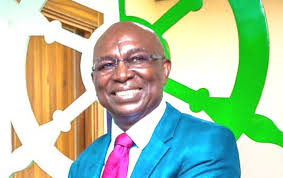After the unexpected bashing of 2020, we all must be grateful to God that we made it to 2020.
Unlike in the years before it, when some apprehension may be expressed about the incoming year, no one foresaw what 2020 dropped on our laps.
It was not predicted, unlike in 2019, when, as a media organisation, we had acknowledged that the then-outgoing year dealt blows on maritime industry players.
But, as if we had an inkling of what was ahead in 2020, this newspaper had written on this same page about this time in 2020, that, “at the risk of being called a pessimist, it is unlikely that 2020 will be any better for the industry than 2019. This however does not indicate that agencies of government will not generate revenue; they will. But the infrastructure decay may continue”. How right we were.
Apart from the COVID-19 pandemic, the issues that dominated the industry in 2020 were not quite different from those of the previous years.
From shippers to clearing agents, to ship owners, haulage operators, stevedoring companies, the story was the same. It was perhaps worse for those who either work or live in the port city of Apapa and its environs, who had to contend with debilitating traffic.
For the importers, the agony of 2020 was about accessibility and cost of foreign exchange, for the customs licensed agents, it was the usually cumbersome and high cost of cargo clearance, for the ship owners it was the same old story of lack of patronage and dominance of foreign ship owners. For the owners/drivers of articulated vehicles that are used for dry and wet cargo haulage, 2020 was worse.
We all saw how trucking of containers out of Lagos ports became a hot cake for truck owners in 2020. It became an avenue for extortion by certain interests.
The problem of haulage was due to the slow pace of the reconstruction going on at the Apapa end of the Oworonsoki –Apapa expressway. The slow pace and the bad roads have now led to congestion, as trucks loaded with containers find it difficult to exit the terminals. The larger effect of this is that ships that have arrived could not offload and the ones that are arriving could not berth.
Just like in the previous years when government mounted pressure on the maritime sector for revenue, owing to the drop in earnings from crude oil, attention was on the sector for revenue for the government in 2020.
It was one year when the Nigeria Customs Service became obsessed with revenue collection. To confirm that it was desperate to up the game of revenue collection, the Service last week announced a whooping N1,562,115,419,216.32 collection in 2020. This is unexpected given the pandemic that affected importation almost throughout the year.
All said, for an industry that suffered the consequences of the COVID-19 pandemic, and the backlash of #EndSARS, it is expected that 2021 will usher-in a better and more assuring respite.
A better and prosperous year can only be assured if some of the issue that have plagued the industry and have almost crippled it are addressed.
First on our ‘wish list’ is the roads leading to Apapa and Tin Can ports. While there is not much problem with the approach to Apapa port, the bedlam from Mile 2 to Tin Can should be tackled early enough in 2021. We are aware that the Lagos State Government has taken over traffic management on the two approaches to Apapa, we are also aware that Nigerian Ports Authourity has promised to introduced an electronic call-up system that is expected to usher-in a better truck control mechanism in and around Apapa.
The above are premised on the readiness of shipping companies to avail truckers of functional and spacious holding bays. Without holding bays to accommodate port-bound empty containers, even if the roads are fully rehabilitated, the efforts of Lagos state government and the NPA will be in vain.
As a maritime media organisation, we are saddened by the fact that, Nigerian waters have become a theatre for sea pirates.
From all indications, it appears like the hope of safety for ships navigating in Nigerian waters is hinged on the $195 million maritime security contract, which even though was signed by the Federal Executive Council in December 2017 is yet to materialize.
The contract that was given to an Israeli firm covers provision of three helicopters, three airplanes, three big battle-ready ships, 12 vessels and 20 amphibious cars to aid security of Nigeria’s waterways.
But the director general of NIMASA, Dr Bashir Jamoh said mid-last year that, the agency has received 85 percent of the assets that are embedded in the contract.
As far as we are concerned, all these amount to rhetoric, for as long as the equipment are not deployed for the safety of ships calling in Nigeria.
However, we are optimistic that the challenges of 2020 will not triumph in 2021. We are very positive that the roads leading to Tin Can port will be free of traffic congestion in 2021. We appeal to the relevant agencies and organisations, especially, the Federal Ministry of Works, the NPA, the Nigerian Shippers’ Council to ensure that this is done. It can then be said that, at least we solved one of the problems.
We pray for a Happy and Prosperous and a better 2021. Amen.
















Discussion about this post